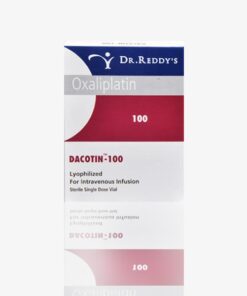Buy Votrient : Pazopanib 400 Mg Tablets 30’S Online
$148.80
Brand Name: Votrient
Active Ingredient: Pazopanib
Manufacturer: GlaxoSmithKline (GSK) Pharmaceuticals Ltd.
Strength: 400 mg
Dosage Form: Tablets
Packaging: Pack of 30 Tablets
Prescription Required*
Votrient is the brand name for Pazopanib 400 mg tablets, a medication used in the treatment of certain types of cancer. Each pack contains 30 tablets. Votrient is a prescription drug and should be used under the guidance of a healthcare professional.
Composition:
Each Votrient tablet contains 400 mg of the active ingredient Pazopanib. The other inactive ingredients may include microcrystalline cellulose, lactose monohydrate, sodium starch glycolate, povidone, and magnesium stearate.
Uses:
Votrient is primarily used for the treatment of the following conditions:
– Renal cell carcinoma (a type of kidney cancer)
– Soft tissue sarcoma (cancer that affects the body’s connective tissue)
– Advanced or metastatic (spreading) ovarian cancer
Usage and Dosage:
The usage and dosage of Votrient should be determined by a healthcare professional based on the patient’s specific condition and medical history. The recommended daily dose for most conditions is 800 mg taken orally once daily on an empty stomach, either 1 hour before or 2 hours after eating.
It is important to follow the prescribed dosage and instructions provided by the healthcare professional. If a dose is missed, it should be skipped and the next dose should be taken at the scheduled time. It is not recommended to take a double dose to make up for a missed one.
Storage Conditions:
Votrient tablets should be stored at room temperature, between 20°C and 25°C (68°F and 77°F). They should be kept in their original packaging to protect them from moisture and light. It is important to keep Votrient out of the reach of children and pets.
Mechanism of Action:
Pazopanib, the active ingredient in Votrient, works by inhibiting certain proteins called tyrosine kinases. These proteins are involved in the growth and spread of cancer cells. By blocking these proteins, Votrient helps to slow down the growth of cancer cells and may shrink tumors.
Contraindications:
Votrient is contraindicated in the following situations:
– Hypersensitivity to Pazopanib or any of the inactive ingredients of the medication
– Severe liver impairment
– History of heart disease, including heart attack or stroke
– Pregnancy or breastfeeding
Interactions:
Votrient may interact with other medications and substances, potentially leading to complications or reduced efficacy. It is important to inform the healthcare professional about all other medications, including over-the-counter drugs, vitamins, and herbal supplements, being taken.
Some drugs that may interact with Votrient include strong CYP3A4 inhibitors such as ketoconazole, itraconazole, and clarithromycin. Certain medications that affect liver enzymes, like rifampin or carbamazepine, may also interact with Votrient. Additionally, grapefruit juice should be avoided during Votrient treatment, as it may increase the concentration of the medication in the blood.
Adverse Reactions:
Votrient may cause various adverse reactions which should be monitored and reported to a healthcare professional. Common side effects may include fatigue, diarrhea, high blood pressure, nausea, loss of appetite, changes in hair color, skin discoloration, and hand-foot syndrome (redness, swelling, or pain on the palms of the hands or bottoms of the feet).
Serious side effects, although rare, may include liver problems, heart problems, bleeding problems, and gastrointestinal perforation. It is important to seek immediate medical attention if any severe side effects or allergic reactions are experienced while taking Votrient.
In conclusion, Votrient is a prescription medication containing the active ingredient Pazopanib, used in the treatment of renal cell carcinoma, soft tissue sarcoma, and ovarian cancer. It inhibits tyrosine kinases involved in cancer cell growth. Votrient should be used under the supervision of a healthcare professional, and any concerns or adverse reactions should be reported promptly.
Be the first to review “Buy Votrient : Pazopanib 400 Mg Tablets 30’S Online” Cancel reply
Related products
Anti Cancer
Anti Cancer
Anti Cancer
Anti Cancer
Anti Cancer













Reviews
There are no reviews yet.